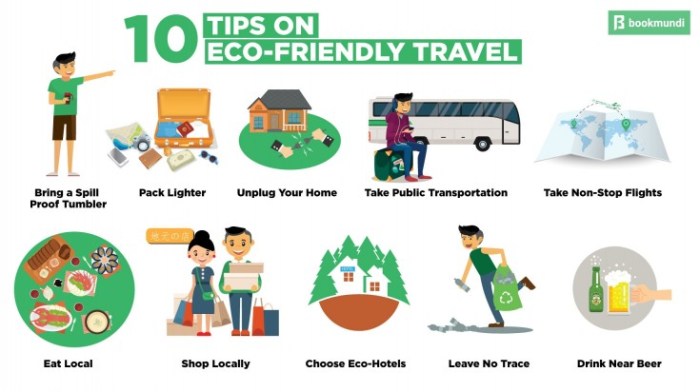Embark on an eco-conscious journey with our comprehensive guide to eco-friendly travel tips. Discover how to minimize your environmental impact while immersing yourself in the wonders of the world. From choosing sustainable transportation options to embracing responsible tourism practices, we’ll empower you to travel with a clear conscience and leave a positive legacy wherever you go.
As global citizens, it’s our collective responsibility to preserve the beauty and integrity of our planet for generations to come. By adopting eco-friendly travel practices, we can explore the world while fostering a sustainable future. This guide provides a wealth of practical tips and insights to help you make informed choices that benefit both the environment and your travel experiences.
Travel Planning: Eco-friendly Travel Tips
Planning an eco-friendly trip involves considering the environmental impact of your choices. By opting for sustainable transportation and accommodations, packing light, and reducing waste, you can minimize your footprint while exploring the world.
Eco-Friendly Transportation
Choosing eco-friendly transportation options, such as trains or buses, can significantly reduce your carbon emissions. When flying is unavoidable, consider airlines with carbon offset programs or invest in carbon offsets yourself. Explore local transportation options like walking, cycling, or using public transport to further minimize your environmental impact.
Sustainable Accommodations
Look for accommodations that prioritize sustainability. Consider eco-lodges, green hotels, or vacation rentals that use renewable energy sources, conserve water, and implement waste reduction practices. Check for certifications like LEED (Leadership in Energy and Environmental Design) or Green Globe to verify their environmental credentials.
Packing Light and Reducing Waste
Pack light to reduce the weight of your luggage, which can lower your carbon emissions during transportation. Opt for reusable items like water bottles, cutlery, and shopping bags to minimize waste. Avoid single-use plastics, such as straws and plastic bags, and bring your own reusable alternatives.
Transportation
Transportation plays a significant role in carbon emissions, contributing to global warming and climate change. Understanding the environmental impact of different modes of transportation is crucial for making eco-friendly travel choices.
Carbon Footprint of Transportation Modes
The carbon footprint of a journey varies depending on the mode of transportation used. Flying has the highest carbon footprint, followed by driving, and then taking trains or buses.
* Flying: Air travel releases significant amounts of carbon dioxide, nitrogen oxides, and water vapor into the atmosphere. These emissions contribute to climate change and air pollution.
* Driving: While driving a car may seem more convenient, it also contributes to carbon emissions. The carbon footprint of driving depends on factors such as the type of vehicle, fuel efficiency, and distance traveled.
* Trains and Buses: Trains and buses are generally more eco-friendly than flying or driving. They produce lower carbon emissions per passenger mile and can be powered by renewable energy sources such as electricity.
Eco-Friendly Airlines and Rail Companies
Some airlines and rail companies have made efforts to reduce their environmental impact by adopting sustainable practices.
Eco-Friendly Airlines:
* Alaska Airlines: Invests in fuel-efficient aircraft and uses sustainable aviation fuel.
* Delta Air Lines: Partners with carbon offset programs and invests in sustainable aviation technologies.
* United Airlines: Has a goal of net-zero emissions by 2050 and invests in electric and hydrogen-powered aircraft.
Eco-Friendly Rail Companies:
* Amtrak: Operates trains powered by electricity and renewable energy sources.
* VIA Rail Canada: Has a program to reduce greenhouse gas emissions and invests in energy-efficient technologies.
* Eurostar: Uses high-speed electric trains that connect London to continental Europe.
Accommodations
When choosing accommodations, consider the sustainability practices of various types of establishments. Eco-certified hotels and guesthouses adhere to environmental standards, such as energy efficiency, water conservation, and waste reduction. These certifications provide assurance that your stay has a minimal impact on the environment.
When planning your travels for 2024, consider incorporating eco-friendly practices to minimize your environmental impact. Opt for sustainable transportation options, choose accommodations that prioritize conservation, and pack reusable items to reduce waste. Explore best travel destinations 2024 that offer unique experiences while promoting responsible tourism.
By adopting eco-friendly travel tips, you can contribute to preserving the beauty of our planet while creating unforgettable memories.
Locally-owned and operated establishments contribute to the local economy and support the community. They often have a deeper understanding of the local culture and can provide valuable insights and recommendations.
While exploring the world, eco-friendly travel tips can help you minimize your environmental impact. If you’re seeking pristine shores, consider the best beaches in the Caribbean , renowned for their turquoise waters and white-sand stretches. Remember to pack reusable items, support local businesses, and respect wildlife to ensure these coastal gems remain pristine for future generations.
Eco-certified Accommodations, Eco-friendly travel tips
- Look for certifications such as LEED (Leadership in Energy and Environmental Design), Green Key, or EarthCheck.
- Check the hotel’s website or contact them directly to inquire about their sustainability practices.
- Consider the hotel’s location and transportation options to minimize your carbon footprint.
Locally-owned Establishments
- Support small, family-run businesses that are deeply rooted in the community.
- Ask the staff about local attractions, restaurants, and activities to gain a more authentic experience.
- Consider guesthouses or bed and breakfasts for a more intimate and personalized stay.
Activities and Experiences
Eco-friendly travel extends beyond transportation and accommodations to the activities and experiences you choose during your trip. By making thoughtful decisions about what you do and how you do it, you can minimize your impact on the environment and support local communities.
Choosing Eco-Friendly Activities
- Opt for activities that promote conservation and sustainability, such as guided nature walks, wildlife safaris, or eco-tours that focus on environmental education.
- Choose activities that support local businesses and economies, such as visiting local markets, taking cooking classes, or hiring local guides.
- Avoid activities that exploit or harm wildlife, such as elephant riding or dolphin shows.
Respecting Local Cultures and Environments
It is essential to respect local cultures and environments when participating in activities and experiences. Here are some tips:
- Follow local customs and traditions, and dress appropriately for the occasion.
- Be mindful of noise levels and avoid disturbing wildlife or local residents.
- Dispose of waste properly and avoid littering.
Minimizing the Impact of Tourism
As a traveler, you have a responsibility to minimize the impact of your activities on natural areas. Here are some tips:
- Stay on designated trails and avoid trampling vegetation.
- Respect wildlife by observing them from a distance and not feeding or harassing them.
- Pack out what you pack in, and dispose of waste properly.
By following these tips, you can enjoy eco-friendly activities and experiences that support local communities and protect the environment for future generations.
Food and Dining

Making sustainable choices while dining can significantly reduce your environmental impact. Here’s how:
Local and Seasonal Food
Choosing local and seasonal food supports local farmers, reduces transportation emissions, and preserves biodiversity. Local food is often fresher, tastier, and more nutritious.
Reducing Food Waste
Food waste is a major environmental problem. Here are some tips to reduce it:
- Plan your meals to avoid overbuying.
- Store food properly to extend its shelf life.
- Compost food scraps instead of throwing them away.
- Support restaurants that offer smaller portion sizes or doggy bags.
Sustainable Restaurants
Look for restaurants that prioritize sustainability by using local ingredients, reducing food waste, and minimizing their carbon footprint.
Avoiding Single-Use Plastics
Single-use plastics are a major source of pollution. Here’s how to avoid them:
- Bring your own reusable utensils, straws, and water bottle.
- Choose restaurants that offer reusable or biodegradable packaging.
- Decline single-use plastics like straws, plastic bags, and takeout containers.
Packing and Gear

Sustainable travel extends beyond transportation and accommodation to encompass all aspects of your journey, including your packing choices. By making mindful decisions about what you bring and how you pack, you can significantly reduce your environmental footprint while traveling.
To help you pack eco-consciously, we’ve compiled a list of reusable items to bring instead of disposables, as well as tips for reducing the environmental impact of your travel gear.
Reusable Items to Bring
| Disposable Item | Reusable Alternative |
|---|---|
| Plastic water bottles | Reusable water bottle |
| Plastic bags | Reusable shopping bags or tote bags |
| Plastic utensils | Reusable cutlery set |
| Plastic straws | Reusable straw |
| Paper napkins | Cloth napkins |
Tips for Reducing the Environmental Impact of Travel Gear
- Choose luggage made from recycled materials or sustainable fabrics like hemp or bamboo.
- Opt for lightweight luggage to reduce fuel consumption during transportation.
- Pack light to minimize the carbon footprint of your flight or other transportation.
- Consider renting or borrowing gear instead of buying new, especially for specialized equipment.
- If you do buy new gear, look for products made from recycled materials or with a low environmental impact.
Responsible Tourism

Responsible tourism aims to minimize negative impacts on the environment and local communities while maximizing benefits for both. It involves respecting local cultures, protecting natural resources, and supporting sustainable practices.
Eco-friendly travel is an increasingly popular way to see the world, and it’s not just about reducing your carbon footprint. It’s also about respecting the environment and local cultures. If you’re looking for an eco-friendly adventure, consider an extreme sports vacation.
From mountain biking to rock climbing, there are plenty of ways to get your adrenaline fix while minimizing your impact on the planet. Just be sure to choose an operator that is committed to sustainability.
As a responsible traveler, you can:
Respect Local Cultures
- Learn about local customs and traditions before your trip.
- Dress appropriately and behave respectfully.
- Support local businesses and artisans.
- Avoid activities that exploit or harm local people or animals.
Protect Natural Resources
- Choose eco-friendly accommodations and activities.
- Conserve water and energy.
- Dispose of waste responsibly.
- Stay on designated trails and avoid damaging plants or wildlife.
Support Local Communities
- Stay in locally-owned guesthouses or hotels.
- Hire local guides and tour operators.
- Buy souvenirs from local artisans.
- Donate to local charities or support community projects.
Eco-friendly Travel Resources

Seeking out information and resources on eco-friendly travel can be overwhelming, but there are many organizations and apps dedicated to helping travelers make sustainable choices.
The following resources provide a wealth of information on eco-friendly travel practices, destinations, and accommodations:
Websites and Organizations
- Green Globe: A global certification program for sustainable tourism businesses.
- Sustainable Travel International: A non-profit organization dedicated to promoting responsible tourism.
- The International Ecotourism Society: A membership organization for ecotourism professionals.
- Tourism Cares: A non-profit organization that supports sustainable tourism initiatives.
- World Wildlife Fund: A global conservation organization that provides information on sustainable travel.
Apps and Tools
| App/Tool | Description |
|---|---|
| PackPoint: | Helps travelers pack light and reduce waste by providing personalized packing lists based on destination and activities. |
| Ecosia: | A search engine that plants trees with its profits, offsetting carbon emissions from travel. |
| Green Globe Certified: | An app that allows travelers to search for and book eco-friendly accommodations worldwide. |
| My Green Trip: | A carbon footprint calculator that helps travelers track and reduce their environmental impact while traveling. |
| Sustainable Travel Earth: | A mobile app that provides information on sustainable destinations, accommodations, and activities. |
Tips for Staying Informed
- Subscribe to newsletters and blogs: Stay up-to-date on the latest eco-friendly travel trends and destinations.
- Follow eco-friendly travel influencers on social media: Get inspiration and learn about new sustainable practices.
- Attend webinars and workshops: Engage with experts and learn more about responsible travel.
- Read travel guides and books: Explore destinations and accommodations that prioritize sustainability.
- Talk to your travel agent: Ask for recommendations on eco-friendly travel options.
Closing Summary
Remember, eco-friendly travel is not just about reducing your carbon footprint; it’s about embracing a mindset of respect and appreciation for the natural world. By incorporating these tips into your travel plans, you’ll not only minimize your environmental impact but also enhance your experiences by connecting more deeply with the destinations you visit.
As you embark on your eco-friendly adventures, remember that every small action makes a difference. Together, we can create a positive ripple effect that transforms the travel industry and safeguards our planet for future generations.
Popular Questions
What are the benefits of eco-friendly travel?
Eco-friendly travel practices reduce your carbon footprint, protect natural resources, support local communities, and enhance your travel experiences by fostering a deeper connection with the destinations you visit.
How can I choose sustainable transportation options?
Consider walking, cycling, or using public transportation instead of driving. When flying is necessary, opt for airlines with strong environmental policies and offset your carbon emissions.
What should I look for when choosing eco-certified accommodations?
Look for accommodations that have implemented water conservation measures, use renewable energy sources, and support local businesses. Certifications such as LEED, Green Key, and EarthCheck can help you identify eco-friendly options.
How can I minimize waste while traveling?
Bring reusable items such as water bottles, cutlery, and shopping bags. Avoid single-use plastics, opt for biodegradable packaging, and support businesses that prioritize waste reduction.
What are the principles of responsible tourism?
Responsible tourism involves respecting local cultures and environments, supporting local communities, and minimizing your environmental impact. It encourages travelers to be mindful of their actions and to make choices that benefit both the destination and its people.